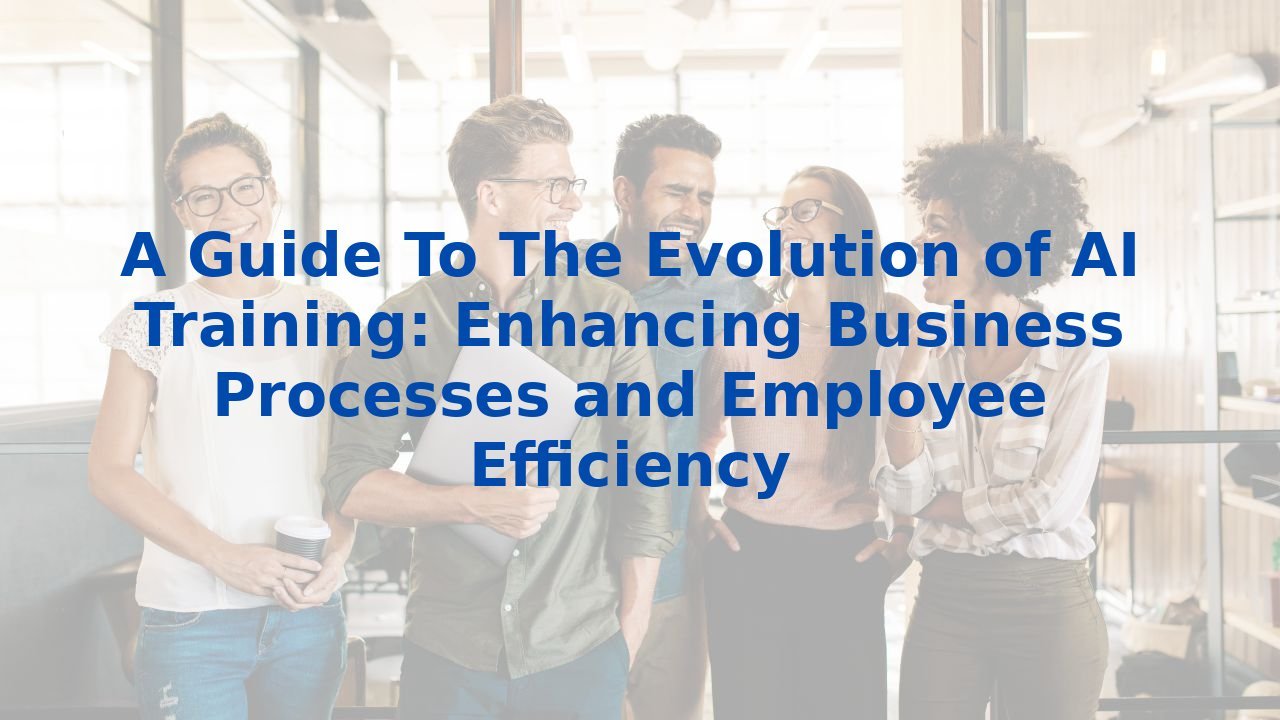A Guide To The Evolution of AI Training: Enhancing Business Processes and Employee Efficiency
A Guide To The Evolution of AI Training: Enhancing Business Processes and Employee Efficiency
Introduction
The integration of Artificial Intelligence (AI) has ushered in a new era for businesses, redefining structures and enhancing operational efficiency like never before. As organizations evolve in their approach to AI training, it becomes crucial to explore how AI can fortify various business processes while improving employee productivity. This guide aims to shed light on key business processes ripe for enhancement through AI, the myriad benefits it can bring, and the essential role of employee training in this transformative journey.
Key Business Processes Enhanced by AI
1. Content Creation and Management
Content is the lifeblood of modern enterprises. The advent of AI in content creation and management facilitates a new level of efficiency yet introduces complexities in data ethics. By leveraging AI, businesses can produce tailored, relevant content that speaks to their audience. However, utilizing user-generated data raises crucial questions about ownership and privacy that organizations must navigate responsibly.
2. News and Article Generation
The news landscape has seen AI tools emerge as powerful allies in content generation. With the capability to analyze popular posts from various platforms and rewrite them, AI can expedite the creation of articles. While this technology offers significant time savings, it also necessitates vigilance concerning the quality and authenticity of the produced content. Organizations must insist on maintaining standards that reflect their values even in automated processes.
3. Academic Research and Writing
AI is making inroads into academia, generating references and entire articles that challenge traditional academic methodologies. This enhancement brings forth a vital need for educators and students alike to cultivate AI literacy. Navigating the complexities of AI-generated content involves critical assessment and alignment with ethical standards—a skill that must be prioritized in modern education.
Benefits of AI Training
1. Enhanced Efficiency
The most apparent benefit of AI training is its ability to streamline business processes. By automating repetitive tasks and elevating data analysis capabilities, organizations can optimize decision-making and operational workflows. This not only reduces overhead costs but accelerates productivity—allowing teams to focus on more strategic initiatives.
2. Improved Customer Experience
AI's ability to analyze customer data on a granular level empowers businesses to deliver personalized experiences that enhance customer satisfaction. In industries such as hospitality, where personalized service is paramount, AI plays a critical role in cultivating loyalty and enhancing the overall customer experience. This tailored approach mirrors a commitment to customer-centricity that can be a game-changer in competitive markets.
3. Competitive Advantage
Organizations that embrace AI training often find themselves at the forefront of their industries. By integrating cutting-edge technologies, businesses can innovate faster, adapt more readily to market fluctuations, and maintain a leading edge over competitors. The capability to redefine services through AI can create novel experiences that resonate profoundly with customers, effectively setting new standards within sectors.
The Importance of Employee Training
1. Understanding AI Capabilities
For businesses to harness the full potential of AI, employees must grasp its capabilities and limitations. This understanding includes how to ask the right questions, construct effective prompts, and critically evaluate the results churned out by AI systems. Empowering employees with this knowledge is essential for maximizing the utility of available AI tools.
2. Ethical Use of AI
Training employees in the ethical use of AI is non-negotiable. The landscape of data privacy, ownership, and potential biases in AI models requires a workforce that operates with integrity and awareness. By educating teams about these factors, organizations can mitigate risks and foster a culture of responsible AI utilization.
3. Continuous Learning
The rapid pace of AI evolution demands an environment of perpetual learning. Employees must stay updated on emerging tools and technologies to seamlessly integrate them into daily operations. Cultivating this mindset of continuous development not only prepares teams for future advancements but also reinforces a culture of adaptability and innovation.
Conclusion
The journey toward AI integration into business processes is both exciting and complex. The enhancements in efficiency and customer experience that AI brings are undeniable, but they come with an obligation to uphold ethical standards. By investing in comprehensive employee training, organizations can harness the full potential of AI, balancing advancement with responsibility and ensuring a brighter, more efficient future.



